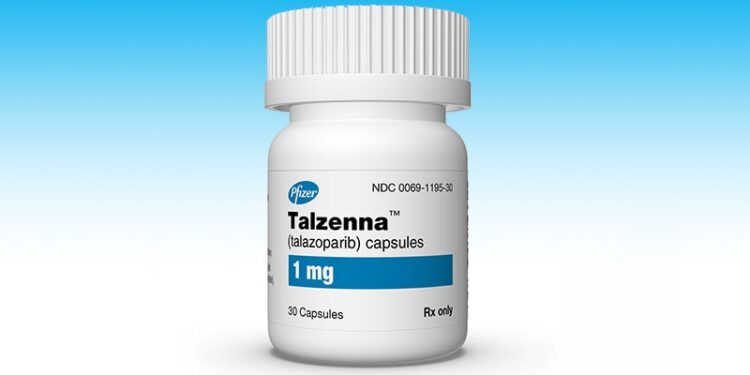Pfizer was taken to task at a recent meeting of the US Food and Drug Administration (FDA)’s Oncologic Drugs Advisory Committee (ODAC) for attempting to expand the use of its prostate cancer drug talazoparib (Talzenna) to men lacking a key biomarker without providing sufficient evidence of benefit.
“It’s tantamount to somebody shooting an arrow on the wall and then painting a target around it,” and that the attempt “is not consistent with a large pharmaceutical company presentation to an advisory committee,” said Richard Pazdur, MD, head of FDA’s Oncology Center of Excellence, during the May 21 meeting.
The FDA approved the poly ADP ribose polymerase (PARP) inhibitor in June 2023 in combination with enzalutamide for men with homologous recombination repair (HRR) mutated metastatic castration–resistant prostate cancer based on a progression-free survival (PFS) benefit vs placebo in the TALAPRO-2 trial.
The application for a mutation-agnostic indication was filed in December 2024 after the company reported better overall survival (OS) not only in men who had the mutation but also in 805 individuals whose HRR mutation status wasn’t known at baseline.
In an exploratory analysis, the company found a trend toward better OS among the men in the group who didn’t have the mutation.
Pfizer is seeking an “all comers” approval based on the results; if granted, the indication for talazoparib would effectively be expanded to include the 70% of patients with metastatic castration–resistant prostate cancer who are HRR mutation free.
Study Design and Increased Toxicity Among FDA’s Concerns
Among FDA’s concerns, is that agency analysts found no OS benefit among nonmutated men when they used a different HRR status measurement than Pfizer (HR, 0.99; 95% CI, 0.67-1.47).
They also noted that adding talazoparib to enzalutamide markedly increases toxicity; approximately 40% of men on the combination, for instance, require blood transfusions for anemia.
The risks mean that the benefit of treatment must be shown to be substantial.
However, the FDA’s main concern with Pfizer’s efforts is that TALAPRO-2 wasn’t specifically designed and powered to show that talazoparib works in men who don’t have an HRR mutation.
There was no prespecified alpha-controlled testing plan, meaning that “the favorable trend in [radiographic] PFS and OS in this subgroup can be a random false positive,” the agency said in a meeting document.
“To put the elephant in the room,” Pazdur explained, Pfizer’s attempt to gain a mutation-agnostic indication based on TALAPRO-2 “is like somebody coming to us with a randomized study, having it completed, and saying ‘oops, I forgot to do a statistical analysis plan.’ We do not have confidence” in the results.
“This is not just a pin-headed issue of statistics,” he continued. “It’s really where the rubber meets the road. As a federal agency, we have to protect the patient’s rights,” and “people have a right to know” how well a treatment is expected to work for them.
FDA presenters noted instances of studies with promising subgroup findings like TALAPRO-2 that fell apart in later randomized trials.
That’s why to expand an indication to include “a huge” number of new patients, “you need robust proof,” Pazdur said.
Pfizer argued during the meeting that the efficacy and safety of talazoparib support the indication expansion.
Panellists Voted Unanimously Against Use Expansion
ODAC was convinced by the FDA’s arguments. The eight panellists voted unanimously that TALAPR0-2 is not sufficient to conclude a favorable benefit-risk profile for talazoparib in patients with prostate cancer who aren’t HRR mutated.
They also agreed with FDA’s broader assertion that cancer drug “efficacy should be formally evaluated in a biomarker-negative population when the biomarker is predictive of response and the prevalence of the biomarker-negative group is high.”
“This is such an important question across all oncology,” said Panellist Neil Vasan, MD, PhD, a medical breast oncologist at New York University, New York City.
“We need to commit to formally evaluating whether targeted therapies benefit patients without the biomarker and not try to ascertain this in some sort of ad hoc way,” he said.
As for the benefit of talazoparib in men who don’t have an HRR mutation, “we just don’t know from this dataset,” said Heidi McKean, MD, a community oncologist in Sioux Falls, South Dakota.
FDA usually follows ODAC’s advice.
M. Alexander Otto is a physician assistant with a master’s degree in medical science and a journalism degree from Newhouse. He is an award-winning medical journalist who worked for several major news outlets before joining Medscape. Alex is also an MIT Knight Science Journalism fellow. Email: [email protected].
Source link : https://www.medscape.com/viewarticle/fda-slams-pfizer-talzenna-biomarker-free-push-2025a1000e2u?src=rss
Author :
Publish date : 2025-05-29 11:33:00
Copyright for syndicated content belongs to the linked Source.














